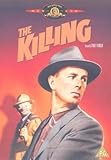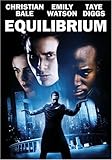Posted by Notcot on Feb 1, 2011 in
Noir 
Among Stanley Kubrick’s early film output The Killing stands out as the most lastingly influential: Quentin Tarantino credits the film as a huge inspiration for Reservoir Dogs and just about any movie or TV show that plays around with its own internal chronology owes the same debt. This sort of convoluted crime caper had really kicked off with John Huston’s The Asphalt Jungle in 1950. From then on, nouveau noir scripts kept trying to find new ways of telling very similar stories. Here the novel Clean Break is adapted for the screen in a jigsaw-puzzle structure that caught Kubrick’s eye. With a dry narration we’re introduced to the key players in a racetrack heist as it’s being planned, but the story bounces back and forth between what happens to each of them during and before the big event. All of this keeps the audience guessing as to exactly how it will go wrong, while the downbeat telling, the unsympathetic characters and the excessively dramatic score clearly foretell that it will go wrong from the start. The denouement is comically daft no matter how many times you see it.
On the DVD: The Killing is a no-frills DVD transfer, in 4:3 ratio and with its original mono soundtrack. Criminally, just one trailer is all that’s been dug up as an extra. –Paul Tonks
<- Read More
Buy Now for [wpramaprice asin=”B000068C3E”] (Best Price)
Tags: asphalt jungle, clean break, crime caper, denouement, downbeat, dramatic score, film output, heist, jigsaw puzzle, John Huston, mono soundtrack, Paul Tonks, Quentin Tarantino, reservoir dogs, Stanley Kubrick
Posted by Notcot on May 18, 2010 in
Cult Film 
Average Rating: 4.0 / 5 (139 Reviews)
Amazon.co.uk Review
From the outset, Star Trek: Deep Space Nine was about conflict. Producers Rick Berman and Michael Piller challenged the utopian ideals of Gene Roddenberry’s Star Trek universe to create something totally different from its predecessors. That meant no familial camaraderie, squeaky-clean Federation diplomacy, or beige décor. Instead they wanted interpersonal friction, ruthless enemies (Gamma Quadrant Imperialists–The Dominion) and rebellion at every turn. The DS9 concept was originally facilitated by introducing the Cardassian/Bajoran war during The Next Generation‘s final days. After a muted first reception fans gradually came to accept the new look, but no one liked Star Trek without a starship and eventually the producers capitulated to viewers’ wishes by introducing the USS Defiant (an apt name) in Season 3.
Relying far less on technobabble than TNG, DS9 was unafraid to focus on matters of the spirit instead, demonstrating a ballsy independence from its parent shows. Taking up the gauntlet thrown down by Babylon 5, improved CGI space battles also became a fan favourite. Throughout the increasingly serialised story arc there were rebellious factions within the different establishments: Kira had belonged to the Shakaar resistance cell; the Maquis was Starfleet vs Cardassians; section 31 was a secret Starfleet group; the True Way was a Bajoran group opposed to peace; the Cardassians had their Obsidian Order and the Romulans their Gestapo-like Tal Shiar. Yet for all its constant bickering and espionage (even Bashir got to be James Bond), there was always some contemporary social commentary lurking: the Ferengi were used as a comedic foil to frown on materialistic greed; drugs were looked at via the Jem’Hadar foot soldiers’ addiction to Ketracel White.
Perhaps Sisko summed up the real heart of things: “Bajor doesn’t need a man, it needs a legend”. A future vision that retains a place for religion and spirituality turned out to be Deep Space Nine‘s first best destiny. –Paul Tonks
Equilibrium
Buy Now for £4.51
Tags: amazon, amazon co uk, apt name, Average, babylon 5, Bajoran, Cardassians, conflict, Deep, deep space nine, Equilibrium, gamma quadrant, Gene Roddenberry, group, Hadar, James Bond, jem hadar, Kira, matters of the spirit, Michael Piller, obsidian order, outset, Paul Tonks, rating, ReviewFrom, Reviews, Rick Berman, shiar, space, Star, star trek deep space nine, star trek universe, Starfleet, story arc, Trek, True Way, utopian ideals

